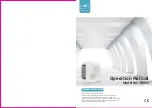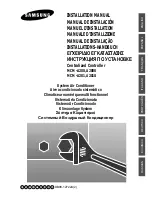
5188236-BIM-A-0316
58
Johnson Controls Unitary Products
Adjustment Of Temperature Rise
The temperature rise (or temperature difference between the
return air and the heated air from the furnace) must lie within
the range shown on the rating plate and the data in the Gas
Heat Application Table 10.
After the temperature rise has been determined, the cfm can be
calculated as follows:
After about 20 minutes of operation, determine the furnace
temperature rise. Take readings of both the return air and the
heated air in the ducts (about six feet from the furnace) where
they will not be affected by radiant heat. Increase the blower
cfm to decrease the temperature rise; decrease the blower cfm
to increase the rise. Refer to the In Door Blower Specification
Table 18.
Troubleshooting
On calls for cooling, if the compressors are operating but the
supply air blower motor does not energize after a short delay
(the room thermostat fan switch is in the “AUTO” position).
1.
Turn the thermostat fan switch to the ON position. If the
supply air blower motor does not energize, go to Step 3.
2.
If the blower motor runs with the fan switch in the ON
position but will not run after the compressor has energized
when the fan switch is in the AUTO position, check the
room thermostat for contact between R and G in the AUTO
position during calls for cooling.
3.
If the supply air blower motor does not energize when the
fan switch is set to ON, check that line voltage is being
supplied to the contacts of the M2, contactor, and that the
contactor is pulled in. Check for loose wiring between the
contactor and the supply air blower motor.
4.
If M2 is pulled in and voltage is supplied to M2, lightly touch
the supply air blower motor housing. If it is hot, the motor
may be off on internal protection. Cancel any thermostat
calls and set the fan switch to AUTO. Wait for the internal
overload to reset. Test again when cool.
5.
If M2 is not pulled in, check for 24 volts at the M2 coil. If 24
volts are present at M2 but M2 is not pulled in, replace the
contactor.
6.
Failing the above, if there is line voltage supplied at M2, M2
is pulled in, and the supply air blower motor still does not
operate, replace the motor.
7.
If 24 volts is not present at M2, check that 24 volts is
present at the UCB supply air blower motor terminal,
“FAN”. If 24 volts is present at the FAN, check for loose
wiring between the UCB and M2.
Table 26: Gas Rate-Cubit Feet per Hour
1
1. By actual measurement, it takes 38 seconds for the hand on
the 1-cubic foot dial to make a revolution with a 100,000 Btuh
furnace running. Using this information, located 38 seconds
in the first column in the table above. Read across to the
column headed “1 Cubic Foot”, where you will see that 95
cubic feet of gas per hour are consumed by the furnace at
that rate. Multiply 95 X 1050 (the Btu rating of the gas
obtained from the local gas company). The result is 99,750
Btuh, which is close to the 100,000 Btuh rating of the furnace.
Seconds for
One Rev.
Size of Test Dial
1/2 cu. ft.
1 cu. ft.
10
180
360
12
150
300
14
129
257
16
113
225
18
100
200
20
90
180
22
82
164
24
75
150
26
69
138
28
64
129
30
60
120
32
56
113
34
53
106
36
50
100
38
47
95
40
45
90
42
43
86
44
41
82
46
39
78
48
37
75
50
36
72
52
35
69
54
34
67
56
32
64
58
31
62
60
30
60
CFM
Btuh Input x 0.8
=
108
.
.
x F Temp Rise
o
Troubleshooting of components may require opening
the electrical control box with the power connected to
the unit.
Use extreme care when working with live
circuits!
Check the unit nameplate for the correct line
voltage and set the voltmeter to the correct range before
making any connections with line terminals.
When not necessary, shut off all electric power to the
unit prior to any of the following maintenance
procedures so as to prevent personal injury.
Label all wires prior to disconnection when servicing
controls. Wiring errors can cause improper and
dangerous operation which could cause injury to person
and/or damage unit components. Verify proper
operation after servicing.
















































